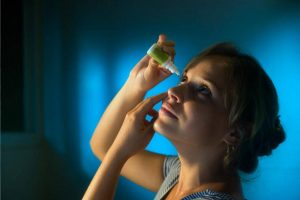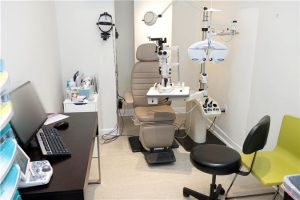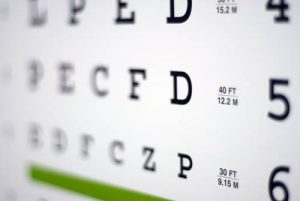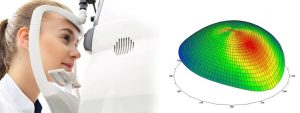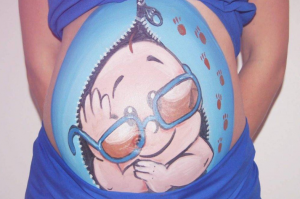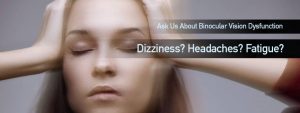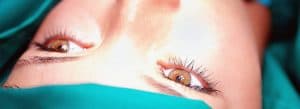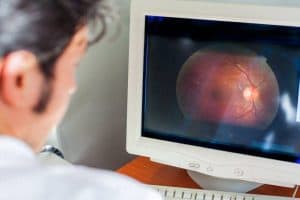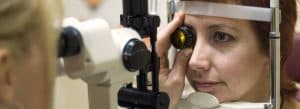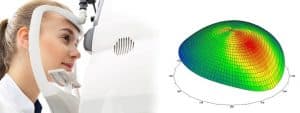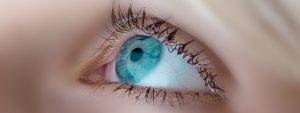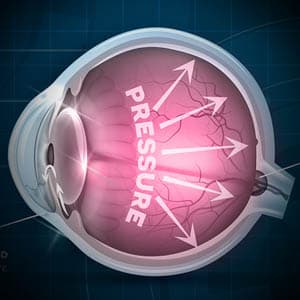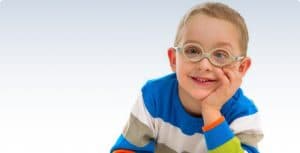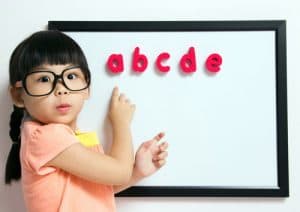How to Protect Your Eyes From Halloween Makeup
Halloween costumes are notorious for heavy makeup and face paint, but did you know that costume makeup contains chemicals and additives that can be potentially
Read MorePink Eye: What Do I Do?
If your child’s eyes are sore, scratchy or watery, they most likely have ‘Pink Eye’. Pink eye is the most common eye problem among children,
Read MoreCan Eye Drops Be Overused?
Overusing eye drops can cause more harm than good. Do you find yourself constantly reaching for eye drops? While eye drops may provide satisfying and
Read MoreCan Sleep Apnea Affect Your Eyes?
Sleep apnea can affect not only your physical health, but can have serious consequences for your eyes and vision too. If you have sleep apnea,
Read MoreWhy Are Eye Exams Important?
Are Eye Exams Important? Yes! Many eye conditions, in their early stages, have no obvious signs or symptoms, so the annual exam is often the only way to detect eye conditions early. Since there are often no signs or symptoms, regular comprehensive eye exams are key to maintaining good vision and healthy eyes.
Read MoreWhich Foods Help Dry Eyes?
Over 50% of all adults experience dry eyes. Other than dryness of the eye, symptoms of dry eye include burning, irritation and grittiness. While studies
Read MoreTypes of Eye Allergies
Up to 25 percent of people worldwide suffer from eye allergies. If you suffer from eye allergies, you may be wondering what is causing your
Read MoreTinted Lenses for Color Blindness
An estimated 1 in 12 men and 1 in 200 women has some degree of color blindness. Color blindness is not an actual blindness, but
Read MoreBurning Eyes at Night
If your eyes are burning at night, you may be suffering from dry eye syndrome. Dry eye syndrome can put a damper on your day
Read MoreThe Larry Fitzgerald Story
Have you heard of NFL star Arizona Cardinals wide receiver, Larry Fitzgerald?
He is the second most career leading receiver for total TDs, yards, catches and more, after the legendary Jerry Rice. Larry credits his success on the field to a customized vision therapy program.
Vision for Rock Climbing
Rock climbing is a sport that requires physical strength, endurance, and balance … and visual skills Did you know that to be a successful climber,
Read MoreThird Nerve Palsy
Third Nerve Palsy, also called Oculomotor Palsy, occurs when the third cranial nerve becomes injured or diseased.
The third cranial nerve controls the actions of four external eye muscles. As the third cranial nerve controls many of the eye’s muscles and functions, palsy of this nerve can result in complete or partial paralysis of the eye.
Fourth Nerve Palsy
Fourth Nerve Palsy, also known as Superior Oblique Palsy or Trochlear Nerve Palsy, occurs when the fourth cranial nerve becomes diseased or damaged. The fourth cranial nerve controls the actions of the superior oblique eye muscle and is responsible for turning the eye inward and downward.
Read MoreNear Point Visual Stress (NPVS)
Modern science now understands why long hours of reading and screen time can lead to eye strain. When the visual system struggles to meet the
Read MoreHow to Help Your Students Succeed
According to the American Optometric Association (AOA), 25 percent of all children have a vision problem significant enough to impact their learning. Up to 80
Read MoreDo You Suffer From Headaches?
If you suffer from frequent headaches you may have binocular vision dysfunction. While this may sound concerning, try not to let yourself worry too much,
Read MoreHow to Improve Your Child’s Reading Skills
If your child struggles to read, they may have an undetected visual problem. Reading fluency and comprehension is dependent on the strength of the visual skills – specifically, binocular vision, saccades, accommodation, visual fixation, and convergence. A deficiency in any of these visual skills can result in reading difficulties, which can consequently impact a child’s ability to learn.
Read MoreDo Vision Screenings Assess Functional Vision?
Most vision screenings conducted at schools measure visual acuity, or how well you can see, but unfortunately, do not assess other important aspects of a
Read MoreVision Therapy for Math: Success Stories
Personal stories from adults and children who improved their math scores following Vision Therapy. *Names have been changed for privacy protection. Click here for a
Read MoreVision Therapy for Spelling: Success Stories
Real life stories of children with spelling difficulties, where an underlying visual problem was diagnosed and treated with Vision Therapy. *Names have been changed for
Read MoreVision Therapy: Success Stories
Real life stories of children with reading difficulties, where an underlying visual problem was diagnosed and treated by an eye doctor experienced in children’s vision. *Names have been changed for privacy protection.
Read MoreKeratoconus Treatment: Corneal Cross-linking
Keratoconus is a progressive eye disease that weakens the cornea and changes its structure — leading to vision problems and even vision loss. The cornea
Read MoreCataract Surgery Complications
Every year, over 9.5 million cataract surgeries are performed, worldwide. While the overwhelming majority (98%) of cataract surgeries are successful, like any surgical procedure there
Read MorePregnancy Complications: When to See an Eye Doctor
How do pregnancy complications affect the eyes? Pregnancy is a time filled with lots of excitement and emotions— but pregnancy can also have an impact
Read MoreCan Pregnancy Affect Vision?
Most moms-to-be are well aware of the bodily changes that remind you on a daily basis that you are expecting— the most common being: morning sickness, food aversions, heightened sense of smell, swollen ankles, headaches, exhaustion, and many other uncomfortable yet normal pregnancy symptoms. What you may not know is that these physiological changes that take place during pregnancy can also lead to changes in your eyes and vision.
Read MorePtosis: Why Is My Eyelid Drooping?
What is ptosis? Ptosis, commonly referred to as a droopy eyelid, occurs when the upper eyelid droops down over the eye. A droopy eyelid can
Read MoreWhat Is an Eye Stroke?
A retinal blood vessel occlusion, commonly referred to as an ‘eye stroke’ occurs when the blood vessels in the eye become narrowed or blocked. The
Read MoreNight Blindness: Treatments and Prevention
Night blindness (nyctalopia) affects vision clarity in low light conditions and can significantly impact performance of daily activities. Night blindness, despite its name, does not
Read MoreWhat Causes Night Blindness?
Night blindness (nyctalopia) causes reduced vision in low light conditions, and can be a source of fear and anxiety for those affected by it. Decreased
Read MoreDo Pencil Push-Ups Work?
Pencil push-ups are a commonly prescribed eye exercise for the treatment of convergence insufficiency (CI). The question is, are they really effective? Pencil push-up treatment
Read MoreE-learning Without Eyestrain: Part 1
Author: Dr. Nate Bonilla-Warford Bright Eyes Family Vision Care A visual health guide for students during the COVID-19 pandemic If your child is experiencing screen-related
Read MoreContact Lenses: What Can Go Wrong?
When it comes to eyewear, contact lenses offer many benefits. But contact lens use can also cause serious complications to your eye health and vision,
Read MoreSmart in Everything… Except School
Author: Dr. Denise Smith The Center for Vision Development, Austin TX Do you know a child who is smart in everything but school? These children
Read MoreVision Therapy and Children’s Vision: Books
Many parents request resources and names of books to help them to gain a deeper understanding of their children and to appreciate the benefits of
Read MoreWhat Is Intermittent Strabismus?
Strabismus, also called an eye turn, can be intermittent or constant— depending on how often it occurs. Intermittent strabismus occurs occasionally, most often during stressful
Read MoreVision Therapy for Adults: Success Stories
Personal stories from adults whose lives have been enhanced with Vision Therapy.
*Names have been changed for privacy protection
Vision Therapy for “Slow Learners”: Success Stories
Personal stories from parents of children labeled as “slow learners” when an underlying vision problem was causing their learning difficulties. *Names have been changed for
Read MoreVision Therapy for “Laziness”: Success Stories
Personal stories from parents of children who were mislabeled as “lazy”, when a vision problem was the underlying cause. *Names have been changed for privacy
Read MoreVision Therapy for Self Confidence: Success Stories
Real life stories of children who struggled with self confidence as a result of an underlying vision problem. *Names have been changed for privacy protection.
Read MoreVision Therapy for Fatigue: Success Stories
Real life stories of adults and children who experienced eye fatigue before completing a program of Vision Therapy. *Names have been changed for privacy protection.
Read MoreVision Therapy for Dizziness: Success Stories
Stories of adults and children who suffered from dizziness or motion sickness prior to completing a program of Vision Therapy. *Names have been changed for
Read MoreVisual Field Testing
What is a visual field test? Your visual field is simply all the areas you can see at one time. This area includes all the
Read MoreKeratoconus
What is keratoconus? Keratoconus is a progressive disease that causes thinning and reshaping of the cornea, the front part of your eye. In a healthy
Read MoreStrabismus Surgery
What is strabismus surgery? Strabismus, also known as “crossed-eyes” occurs when the two eyes are unable to achieve proper alignment to focus on an object.
Read MoreHow Is Convergence Insufficiency Diagnosed?
Do you often lose your place while reading? Do words on the computer screen seem blurry? Do you suffer from frequent headaches or eye discomfort
Read MoreCan Glasses or Eye Patches Treat Convergence Insufficiency?
If you have been diagnosed with convergence insufficiency (CI), or are experiencing symptoms of CI, you may be wondering how CI is treated. Any type
Read MoreDo I Have Convergence Insufficiency?
Wondering if convergence insufficiency (CI) is impacting your school or work performance? Take this quick quiz to find out. People with CI often experience blurry
Read MoreWet Macular Degeneration (AMD)
Wet AMD accounts for approximately 10 percent of all AMD cases, but is responsible for 90 percent of legal blindness. Wet AMD develops as a result of abnormal blood vessels that form under the retina, and leak blood and fluid into the macula. Wet AMD is the more advanced stage of AMD, with dry AMD usually preceding it.
Read MoreWhat Is a Diabetic Eye Exam?
If you have been diagnosed with diabetes, annual eye exams will help to protect your eyes from serious sight-threatening eye diseases, linked to diabetes. Diabetes is a condition that prevents the body from using and storing sugar properly. As a result, excessive amounts of sugar remain in the bloodstream and if uncontrolled, can cause damage to the tiny blood vessels all over the body, including those in your eyes.
Read MoreAmsler Grid Test: Screening for AMD
Early detection of eye disease is crucial when it comes to protecting your eye health and vision. Macular degeneration (AMD) is the number one cause
Read More8 Tips to Protect Your Child’s Vision
Visual health is crucial for all aspects of life – seeing, learning, and connecting with others. Follow these tips to protect your child’s eyes and developing vision, to give them a life-time of clear vision, good eye health and the best opportunity to succeed in school and the sports field.
Read MoreDyslexia FAQs
Q: What is dyslexia? A: Dyslexia is a complex condition that impacts the way the brain processes and interprets information. It is one of the
Read MoreMyopia Management FAQs
Q1: What is myopia? A: Myopia is a refractive error, or a vision condition that affects the ability to see distant images or objects clearly.
Read MoreNormal Tension Glaucoma
What is normal tension glaucoma (NTG)? Glaucoma is the name for a group of ocular diseases that occur as a result of: High eye pressure
Read MoreGlaucoma FAQs
The top 12 glaucoma questions asked by patients to their eye doctors.
Read MoreWhat Is Open Angle Glaucoma?
Open-angle glaucoma accounts for more than 80% of all glaucoma cases. Open angle glaucoma (OAG) is the most common form of glaucoma that usually progresses
Read MoreWhat Is Angle Closure Glaucoma?
Angle closure glaucoma is a rare, but serious form of glaucoma that requires immediate medical attention. Closed angle glaucoma develops as a result of a
Read MoreDoes Dyslexia Affect Adults?
Recent data shows that 1 in 10 adults have dyslexia and adults with dyslexia typically experience many challenges in the workplace and many adults also have low self esteem as a result of their dyslexia. Vision therapy has been shown to lead to improved reading, writing, and spelling. Vision therapy could be the solution you have been lookin for.
Read MoreInternal Eye Infections
Here is a guide to the most common internal eye infections, their symptoms, and treatment methods. Eye infections can be quite uncomfortable, causing redness, pain,
Read MoreDigital Eye Strain
Digital eye strain (DES), also known as computer vision syndrome (CVS) affects over 50 percent of people, including both children and adults. Symptoms fall into two main categories: those linked to accommodative or binocular vision stress, and external symptoms linked to dry eye.
Read MoreBlue Light and Screens
Over exposure to high energy visible (HEV) blue light may be harmful to your health, and has become a rising concern among eye care professionals.
Read MoreCorneal Diseases
What is the cornea? The cornea is the clear, protective outer layer of the eye. It acts as a barrier and filter— protecting our eyes
Read MoreGuide to Eye Conditions
Early detection of most eye conditions can ensure you maintain clear sight and enjoy years of good eye health. Have you been told you have an eye disease or need eye surgery? There are 4 main eye diseases, and many others than can impact your vision.
Read MoreWhat is Laser Refractive Surgery?
Are you thinking of having laser eye surgery? Laser eye surgery, also called laser refractive surgery, is a common procedure that is performed to eliminate the need for eye wear— both glasses and contact lenses. Up to 98 percent of patients achieve 20/20 vision with laser eye surgery.
Read MoreOptical Lenses
In recent years, the transition from glass to plastic lenses has revolutionized the way we see. In the past, eyeglass lenses were made of glass. However, in recent years, lenses have transitioned to a durable plastic, that is lighter in weight, and less prone to breaking— providing a more comfortable experience.
Read MoreOptical Frames
Shopping for eyeglass frames can be quite overwhelming… but also lots of fun! Eyeglasses nowadays come in a variety of styles, shapes, colors, and materials— metal, plastic, and even natural wood. Optical stores are filled with rows and rows of frames, manufactured by popular brands and designers to suit every taste and unique fashion sense.
Read MoreWhat is Glaucoma?
Have you been diagnosed with Glaucoma? Glaucoma is a progressive ocular disease that causes vision loss from damage to the optic nerve, which is responsible for carrying visual signals between the eye and brain.
Read MoreHow to Prevent Eye Allergies
If you suffer from red, sore allergic eyes, there are several ways to prevent this condition from affecting your life. Allergies are a common complaint,
Read MoreEyecare for Children
Eyecare for Children Are you worried about your child needing glasses? Do you want to understand why your child needs bifocals or multifocals? Are you
Read MoreDoes My Child Have ADHD?
The primary behaviors associated with ADHD are inattention, hyperactivity, and impulsivity. These are similar to those experienced with undiagnosed visual problems and may be improved with vision therapy.
Read MoreGuide to Eye Turns
Eye turns, are also known as strabismus, and affect over 1 in 20 babies and toddlers. With early detection and eye care treatment, with eyeglasses and vision therapy, the eye turn can often be resolved, without relying on complicated eye surgeries.
Read MoreVision for School
Is your child not reaching their potential at school? For a child to succeed in school they need excellent vision and strong visual skills, including eye tracking, focusing, binocular vision and visual processing. These skills can be enhanced with the correct eyewear and vision therapy.
Read MoreVision Therapy for Lazy Eye
Lazy eye is a common vision problem, affecting up to 1 in 20 (5%) of all children. Has your child been treated for lazy eye, yet the vision remains poor? Lazy eye can be successfully treated for both children and adults, with new digital techniques using computer-based 3D games.
Read MoreOptometric Management of Dyslexia
Comprehensive eye exams are essential if your child has been diagnosed with dyslexia.
Children diagnosed with dyslexia could have an undiagnosed visual problem and may respond well to options such as eyeglasses or vision therapy.
What Is Astigmatism?
Astigmatism is one of the most misunderstood optical terms…maybe because it is so hard to say?! Astigmatism is a refractive error that causes distorted vision, usually at all distances. It is a common vision condition that can be present at birth, or develop over time, and most frequently occurs together with myopia (nearsightedness) or hyperopia (farsightedness).
Read MoreVision Therapy
Just checking how exerpts work
Read MoreVision and Sensory Processing Disorder
Have you been told your child has a sensory processing disorder (SPD)? Sensory processing disorders (SPD) can be life-changing, but many eye doctors can now offer you a range of options to best manage your child and allow them to maximize their engagement with the world.
Read MoreVision and Non-Verbal Learning Disorder (NVLD)
Guide to Non-Verbal Learning Disorder (NVLD). NVLD can significantly impact a child’s life, however many eye doctors can provide the solution you have looking for.
Read MoreNAACP: Vision and Learning Statement
NAACP Passes Resolution on Vision, Learning, and High-Risk Populations at its 100th Anniversary National Convention, New York, NY 2009 PR Newswire, September 29, 2009 Charles
Read MoreEye Conditions That Cause Strabismus
Many common eye conditions can lead to an eye turn. Eye turns affect over 3 people in 100 and can be successfully treated by eye doctors, often without needing complex eye surgery.
Read MoreParent’s Checklist to Identify a Vision Problem
Is a vision problem impacting your child’s academic success or athletic performance?
Did you know that vision problems affect up to 25 in every 100 children – that’s at least six students in every class.
This checklist can be a useful tool for you to understand all of the behavioral and physical symptoms that your child is experiencing, and may help to facilitate the identification of a vision problem.
Harvard Statement: Vision and Literacy
‘Vision and Literacy: An Educational Problem that can be Solved’ Published by the Harvard Graduate School of Education (2001) On Tuesday, April 4, 2001, a
Read MoreDoes My Child Have Dyslexia?
Has your child been diagnosed with Dyslexia? Since up to 80 percent of learning in school is acquired through vision, a child diagnosed with dyslexia may actually have an undiagnosed vision problem, causing difficulties with their academic performance.
Read MoreDigital Eye Strain: Myths and Facts
Digital eye strain (DES), also known as computer vision syndrome (CVS) affects over 50 percent of people, including both children and adults. In recent years,
Read More

